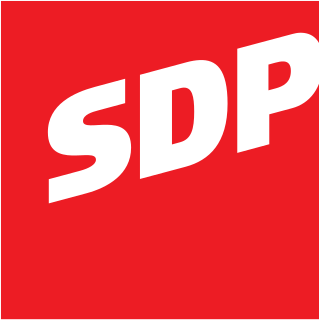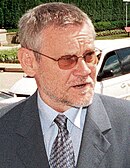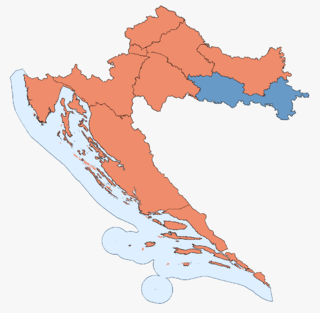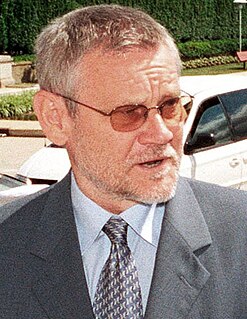| |||||||||||||||||||||||||||||||||||||||||||||||||||||
All 151 seats to Chamber of Representatives 76 seats needed for a majority | |||||||||||||||||||||||||||||||||||||||||||||||||||||
| Turnout | 70.5% | ||||||||||||||||||||||||||||||||||||||||||||||||||||
| |||||||||||||||||||||||||||||||||||||||||||||||||||||
Results of the election in each of the ten electoral districts of Croatia: the party with the majority of votes in each electoral unit. SDP-HSLS coalition: red; HDZ: blue | |||||||||||||||||||||||||||||||||||||||||||||||||||||
| |||||||||||||||||||||||||||||||||||||||||||||||||||||
| 1992 election • MPs |
| 1995 election • MPs |
| 2000 election• MPs |
| 2003 election • MPs |
Parliamentary elections for the Chamber of Representatives of the Croatian Parliament were held on 3 January 2000. These were the first elections to be held after the expiration of a full 4-year term of the previous Chamber of Representatives.

The Croatian Parliament or the Sabor is the unicameral representative body of the citizens of the Republic of Croatia; it is Croatia's legislature. Under the terms of the Croatian Constitution, the Sabor represents the people and is vested with legislative power. The Sabor is composed of 151 members elected to a four-year term on the basis of direct, universal and equal suffrage by secret ballot. Seats are allocated according to the Croatian Parliament electoral districts: 140 members of the parliament are elected in multi-seat constituencies, 8 from the minorities and 3 from the Croatian diaspora. The Sabor is presided over by a Speaker, who is assisted by at least one deputy speaker.
Contents
The ruling Croatian Democratic Union entered the elections weakened by the Zagreb Crisis, street protests and the series of corruption scandals that came to light in the previous parliamentary term. However, the most important factor was the deteriorating health of the party leader and Croatian president Franjo Tuđman, which sparked a succession struggle between various factions within the party.

The Croatian Democratic Union is a conservative political party and the main centre-right political party in Croatia. It is one of the two major contemporary political parties in Croatia, along with the centre-left Social Democratic Party (SDP). It is currently the largest party in the Sabor with 55 seats. The HDZ ruled Croatia from 1990 after the country gained independence from Yugoslavia until 2000 and, in coalition with junior partners, from 2003 to 2011, and since 2016. The party is a member of the European People's Party (EPP). HDZ's leader, Andrej Plenković, is the current Prime Minister of Croatia, having taken office following the 2016 Parliamentary Election.

Franjo Tuđman, also written as Franjo Tudjman, was a Croatian politician and historian. Following the country's independence from Yugoslavia he became the first President of Croatia and served as president from 1990 until his death in 1999. He was the 9th and last President of the Presidency of SR Croatia from May to July 1990.
On the other side, two major Croatian opposition parties - the Social Democratic Party of Croatia and Croatian Social Liberal Party - had their coalition formally agreed in 1998 and spent more than a year preparing for the elections. At first, they were to run together with the Croatian Peasant Party, Croatian People's Party, Istrian Democratic Assembly and Liberal Party, but as Tuđman's condition worsened leaders of the SDP and HSLS concluded that they could win elections even without those four other parties which later formed a separate bloc.

The Social Democratic Party of Croatia is a social-democratic political party and the largest party of the Croatian centre-left. The SDP is one of the two major political parties in Croatia, along with the centre-right Croatian Democratic Union (HDZ).

The Croatian Social Liberal Party is a conservative-liberal political party in Croatia. The HSLS was formed in 1989 as the first Croatian political party formed after the reintroduction of multi-party system.

The Croatian Peasant Party is a centrist political party in Croatia founded on December 22, 1904 by Antun and Stjepan Radić as Croatian Peoples' Peasant Party (HPSS). Brothers Radić considered that the realization of Croatian statehood was possible within Austria-Hungary, but that it had to be reformed into a Monarchy divided into three equal parts – Austria, Hungary, Croatia. After the creation of Kingdom of Yugoslavia in 1918, Party requested for the Croatian part of the Kingdom to be based on self-determination. This brought them great public support which columned in 1920 parliamentary election when HPSS won all 58 seats assigned to Croatia.
Like before all previous elections since the breakup of Yugoslavia, the electoral laws were altered in an attempt to improve the chances for the ruling party; this included a new voting system and redistricting. The First Past the Post constituencies introduced in the previous election were completely abandoned and Proportional Representation was implemented (with the exception of single representative ethnic minority seats). Croatia was divided into ten electoral districts, all drawn in order to maximise the support for HDZ. Each district had to elect 14 members, with candidates' lists having to win more than 5% of the votes in order to be represented in the Sabor.

The Croatian Parliament electoral districts are the special territorial subdivision of Croatia used for the country's parliamentary elections.
Due to Tuđman's illness and death, the actual date of elections had been repeatedly postponed for constitutional reasons. There were speculations about elections being held during the Christmas holidays in order to have as many Croatian expatriates (traditional HDZ supporters) in the country, but the date of 3 January was chosen as the most suitable. As the day of the elections approached, its outcome became more certain. The campaign was brief and relatively uneventful with the HDZ being visibly weakened and demoralised by the death of its long-term leader. On the actual day of elections the turnout - the biggest since 1990 - indicated the Croatian people's desire to have their government changed.
Račan was appointed Prime Minister on 27 January 2000, by a decree of the Acting President of Croatia and Speaker of the outgoing assembly of Parliament, Vlatko Pavletić, and this decision was later confirmed by a parliamentary vote on 2 February 2000 in which 122 of 151 MPs voted in favor and 1 against the cabinet, while 1 MP abstained. [1] [2] Račan led a coalition of SDP and HSLS, which together with a bloc of four other parties held two-thirds majority in Parliament, allowing them to amend the Constitution and transform Croatia from a semi-presidential system into a incomplete parliamentary system in November 2000 and abolish the upper chamber of Parliament, the Chamber of Counties, in March 2001. The constitutional changes of 2000 greatly limited the power of the president, but retained the direct election of that office.

Vlatko Pavletić was a Croatian politician, university professor, literary critic and essayist.

The Constitution of the Republic of Croatia is promulgated by the Croatian Parliament.

A semi-presidential system or dual executive system is a system of government in which a president exists alongside a prime minister and a cabinet, with the latter being responsible to the legislature of a state. It differs from a parliamentary republic in that it has a popularly elected head of state, who is more than a mostly ceremonial/non-executive, figurehead, and from the presidential system in that the cabinet, although named by the president, is responsible to the legislature, which may force the cabinet to resign through a motion of no confidence.











